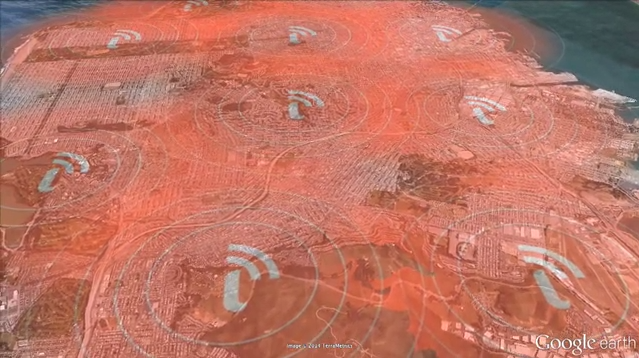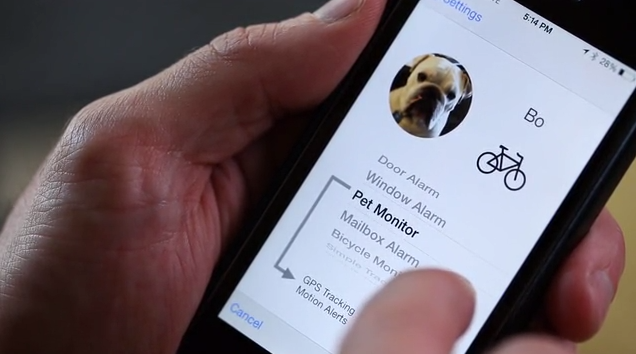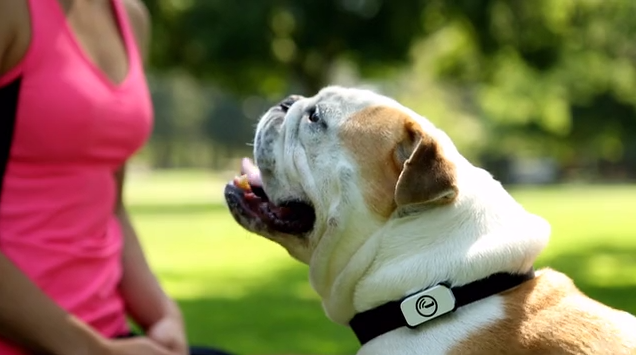Iota is a wireless personal tracker device, plus corresponding app, whose makers are aiming to deploy in the U.S. market at the start of next year. They raised $350,000 last August from Zenshin Capital to develop the tech, and have now taken to Kickstarter to crowdfund the last mile.
The twist vs other lost item tracker devices (of which there are myriad — so many, in fact, that frankly I’ve lost count; just one extant example that springs to mind is Tile) is that Iota boasts a longer and more reliable tracking range than some rivals, and has no monthly subscription fees — being as it’s not running over a standard cellular network.
Iota‘s system requires its users to help create the tracking network by running a wireless hub device in their home. So, if you opt in, you could potentially find your lost stuff over longer distances and — they claim — at a lower cost than other GPS tracking techs (or similar).
To track your stuff both indoors and out Iota uses GPS to position items to within 30 feet, its own proprietary long-range wireless tech for coverage that apparently extends to a range of miles, and Bluetooth connectivity. Its app can be used to locate tagged items on a map, set up geofences for particular items, or define a particular usage profile.
Iota’s 43mm x 22mm x 11mm tracking devices, which can be fixed to various accessories (such as, for instance, pet collars), also include an accelerometer for movement detection, a speaker so they can sound an alarm on demand (say if you’re wondering where you put your keys down), and a temperature sensor — so Iota devices could also be used for notifications such as alerting you when a door is opened, or when the temperature is rising inside your car.
The trackers are also waterproof and have a rechargeable battery that apparently lasts “months” under average usage — which assumes you’re not going to need to be constantly pinging something to figure out where it is.
The tracker device works in conjunction with a home base station — which is fixed to a window in your home and contributes a wireless portion of the Iota tracking network. Each home hub generates a tracking range that its makers claim can extend up to eight miles. Or two miles in a dense urban environment such as San Francisco.
With a range like that, they say only a handful of Iota home bases are required to blanket an entire city — since every Iota device can piggyback on any Iota home base network, rather than being limited to only working with the owner’s own home base.

Now let’s zoom out for a moment to take a look at the bigger picture.
Digital surveillance is generally turning into a many layered toxic hellbrew. At the top of the anti-privacy pyramid we have governments and their agencies keeping digital tabs on our communications. On the next slice down, it’s huge overreaching digital corporate entities — such as Google, Facebook and Amazon, making mountains of money from data mining and joining the dots of all the stuff we do online (from arguably trivial stuff like recreation and shopping to more substantial and personal stuff like communicating, socialising, work and healthcare).
Then, beneath those guys, there’s a chaotic sea of smaller startups promising some cheap thrill in exchange for us opting in with our data — so they have a chance to grow as powerful as the platforms they cling to.
Aside from the imposed government security agencies layer, what’s most frightening here is that most of these massive privacy infringements are opt in. If the product is free, chances are you’re paying with your privacy — yet a majority of digital users don’t seem to know or care. Which swings opens the door for yet more encroachments.
Iota is another such opt in startup — whose surface aim is to enable people to track valuable objects, pets and even family members. It says its ambition is to build a nationwide network where Iota tagged items can be tracked.
And it’s aiming to get the crowd to fund this self-service surveillance layer — with a just launched a Kickstarter crowdfunding campaign, that’s looking to pull in $250,000 to get its long-distance tracking devices to market. The starter price for Iota is just $99 for early backers — half the cost of the eventual planned retail price.
Now, on the one hand, you can view Iota as a convenient technology that lets you keep tabs on valuable items or loved ones. But, on the flip side, the technology could be a tool for tracking the movements of people without them being aware. Attach an Iota to the underside of someone’s car, for instance, and you could remotely map their comings and goings on the sly.
Iota’s makers point out that doing that is illegal under Californian law. But something being illegal is not the same as something being impossible. And the technology is making increasing layers of surveillance more possible than ever before.
So the wider point here is what cost privacy? With more tracking technologies being built, adopted and deployed how long before the ability to know where anything of value is at all times becomes socially normalized — expected, even?
Technology is always a double edged sword, but Iota’s makers aren’t concerning themselves with the wider privacy implications of what they’re building — beyond noting that location data they collect is encrypted with AES encryption and kept “completely confidential”. They’re just building it, they say. It’s up to the users not to abuse it.
“Because the range of our Home Base to the Iota is 2-4 miles, we only need around 10 Home Bases to cover all of San Francisco. This provides the customer with true real time locationing capability,” says Iota’s Ben Wild, explaining how the system works.
“Once the customer opens up the app, the initial Iota‘s location would typically appear in less than one minute and then can be updated more frequently (around every 20 seconds) as they are searching for their pet for example.”

Wild says development of Iota has focused on optimizing battery management to differentiate the system from GPS trackers which use cellular networks — meaning they tend to require more regular charging (such as daily).
Incidentally, a tracker than needs recharging daily isn’t a very effect sneak tracking device vs one that can be left operating in place for months at a time (Iota’s battery life can extend to some two to three months on a single charge, according to its makers).
“When we first started working on Iota 3 years ago, we could not find any off the shelf radio technology that would give us the long range and long battery life that we required. We spent quite a bit of effort optimizing our protocol to achieve both very long range and long battery life,” says Wild.
“We currently use a spread spectrum radio technology on the physical layer. By using spread spectrum we minimize the interference that we cause to other unlicensed devices running on the 902-928MHz band. Additionally we are not as sensitive to narrowband interference that are caused by other devices such as garage door openers and toys that are also running on the band.
“To further reduce interference and maximize battery life for tracking applications, the Iota does not transmit any messages to the Home Base unless the owner of the Iota opens up the smartphone app and requests a location update. Our protocol also scales the data rate from the Home Base to the Iotas depending on how far the Iota is from the Home Base. For an Iota that is used as a home security sensor, the data rate is on the order of a few hundred kilobits per second. For the Iotas that are a mile or more away, the data rate will scale down on the order of a few hundred bits per second (the trick to getting very long range is to trade off data rate for range).”
Each Iota home base can apparently support “thousands” of Iotas within close range running at higher data rates, or “hundreds” of Iotas “for most applications” when the tracking devices are farther away running at lower data rates, according to Wild.
“A specific Home Base gives priority to the Iotas that are associated with the owner of that Home Base,” he adds.
The startup has additional plans to expand the range of home sensors supported by its radio tech — to, as Wild puts it “increase the value of installing a Home Base”.
“We have seen companies such as Smartthings demonstrate that there is big demand for flood sensors, home security sensors and lighting control. We feel that having a single gateway in the home that can connect both these short range sensors as well as the long range tracking devices provides a lot of value to the consumer,” he adds.
Of course if it can convince enough people to instal its wireless hubs in their homes to achieve a nationwide item tracking network that’s going to position this startup atop a mountain of valuable movement and ownership data.
To get there it just needs to convince people that giving up some of their privacy is a worthwhile cost to mitigate the risk of something else being lost.
